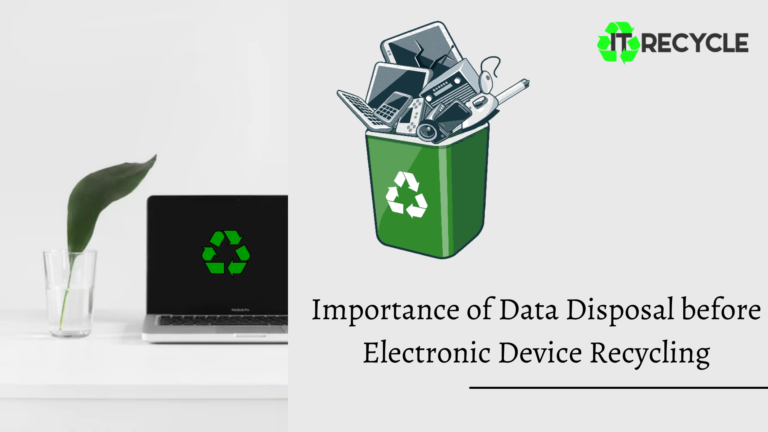Choosing Between On-site and Off-site Data Demolition Services
Data demolition is a crucial process for businesses looking to securely dispose of their data. When it comes to data demolition, there are two options to consider: on-site and off-site services. Both options have their advantages and disadvantages, and it’s important for businesses to understand the differences and choose the best option for their needs.
On-site data demolition involves the destruction of data at the client’s premises using specialized equipment. This option offers enhanced data security and allows businesses to maintain control and oversight of the destruction process. It’s particularly useful for businesses handling highly sensitive data or those with strict compliance requirements.
On the other hand, off-site data demolition involves transporting the data to a secure facility where it is destroyed. These facilities have advanced security measures in place to ensure the highest level of data protection. Off-site services can be more cost-effective for businesses, as they eliminate the need for investing in specialized equipment and expertise for on-site destruction.
When choosing between on-site and off-site data demolition services, businesses should consider factors such as the sensitivity and volume of the data, as well as their compliance requirements. It’s essential to follow best practices for data demolition, including establishing clear procedures, using secure methods and tools, and documenting the destruction process. Obtaining a certificate of destruction from the service provider provides proof of compliant data disposal.
In conclusion, the decision between on-site and off-site data demolition services requires careful consideration. By selecting a reputable and experienced service provider and evaluating specific needs and requirements, businesses can ensure the secure and compliant disposal of their data. Consulting with a professional service provider is highly recommended to make an informed decision.
Benefits of On-site Data Demolition Services
On-site data demolition services offer several benefits to businesses. Firstly, they provide enhanced data security as the destruction of data takes place at the client’s premises, reducing the risk of data breaches during transportation. This ensures that sensitive information remains protected within the organization’s controlled environment, mitigating the potential vulnerabilities associated with data transfer. On-site data demolition services are particularly beneficial for industries dealing with highly sensitive data, such as healthcare, finance, and legal sectors.
Secondly, on-site services allow businesses to maintain control and oversight of the data destruction process. By having the destruction performed at their premises, businesses can closely monitor the entire operation and ensure compliance with relevant regulations and industry standards. This level of control not only bolsters data security but also fosters a culture of accountability and transparency, reassuring stakeholders that their data is being handled responsibly.
Additionally, on-site data demolition services offer greater convenience and flexibility. Businesses can schedule the data destruction process at a time that is most convenient for them, minimizing disruptions to their operations. This flexibility is particularly valuable for organizations with strict timelines or those that require immediate data disposal, such as during an office relocation or equipment upgrade.
“On-site data demolition services provide businesses with enhanced data security, control, and flexibility, making them an appealing choice for organizations with sensitive information and strict compliance requirements.” – Data Security Expert
The benefits of on-site data demolition services are summarized in the following table:
| Benefits of On-site Data Demolition Services |
|---|
| Enhanced data security |
| Control and oversight of the destruction process |
| Compliance with relevant regulations and standards |
| Convenience and flexibility in scheduling |
Implementing on-site data demolition services can greatly enhance an organization’s data security, promote compliance, and streamline the data disposal process. However, it is important to consider the specific needs and requirements of the business before making a decision, taking into account factors such as data sensitivity, volume of data, and compliance regulations. With careful deliberation and the assistance of a reputable service provider, businesses can ensure the secure and compliant destruction of their data.
Advantages of Off-site Data Demolition Services
Off-site data demolition services offer businesses several advantages over on-site options. When opting for off-site services, one of the primary benefits is the use of a secure facility specifically designed for data destruction. These facilities go beyond standard security measures to ensure the highest level of data protection.
“Off-site data demolition services provide businesses with the peace of mind that their sensitive data is being destroyed in a secure environment.”
In these secure facilities, advanced security measures such as surveillance cameras, access controls, and secure storage areas are implemented. This ensures that throughout the destruction process, businesses can trust that their data remains protected and confidential.
Furthermore, off-site services often prove to be more cost-effective for businesses. By outsourcing data demolition to a specialized service provider, businesses eliminate the need to invest in costly specialized equipment and expertise required for on-site data destruction.
By opting for off-site data demolition services, businesses can have confidence in the secure destruction of their data while enjoying the cost savings gained from not having to invest in on-site equipment and expertise.
Advantages of Off-site Data Demolition Services
| Advantages | Description |
|---|---|
| Enhanced Data Security | Use of a secure facility with advanced security measures |
| Cost Savings | Eliminates the need for investment in specialized equipment and expertise |
Factors to Consider in Choosing Between On-site and Off-site Data Demolition Services
When making the decision between on-site and off-site data demolition services, businesses should take into account several crucial factors that can significantly impact the success and efficiency of their data disposal process. Understanding these elements will enable businesses to make an informed choice that aligns with their unique needs and requirements.
Data Sensitivity
The sensitivity of the data should be a primary consideration when selecting a data demolition service. Highly sensitive data, such as confidential customer information or classified business data, may require on-site destruction to minimize the risk of exposure during transportation. On-site data demolition ensures that the data remains within the secure confines of the business premises, reducing the chances of unauthorized access or breaches.
Volume of Data
The volume of data to be destroyed also plays a crucial role in determining the appropriate data demolition service. For businesses dealing with a large quantity of data, off-site data demolition services can be more efficient and cost-effective. Off-site facilities are equipped with specialized machinery and processes that can handle significant volumes of data with ease, minimizing the time and resources required for data disposal.
Compliance Requirements
Businesses must ensure that the chosen data demolition service aligns with all compliance requirements and regulations applicable to their industry. Compliance regulations, such as the General Data Protection Regulation (GDPR) or industry-specific guidelines, dictate specific protocols for data destruction. Both on-site and off-site data demolition services should adhere to these requirements to maintain legal and regulatory compliance.
By carefully considering the aforementioned factors, businesses can make an informed decision about whether on-site or off-site data demolition services are most suitable for their specific scenario. Tailoring the choice to the data sensitivity, volume, and compliance requirements will facilitate a successful data disposal process.
| Factors | On-site Data Demolition | Off-site Data Demolition |
|---|---|---|
| Data Sensitivity | Highly sensitive data can be destroyed on-site, minimizing the risk of exposure during transportation. | Data remains secure during transportation and is destroyed in a dedicated off-site facility. |
| Volume of Data | Efficient for smaller quantities of data that can be managed on-site. | Cost-effective for large volumes of data that can be processed in off-site facilities. |
| Compliance Requirements | On-site services should comply with all applicable regulations and industry standards for data destruction. | Off-site facilities must adhere to compliance requirements and provide documentation of proper data disposal. |
Best Practices for Data Demolition
Regardless of whether businesses choose on-site or off-site data demolition services, it is essential to follow best practices for data destruction. By implementing these practices, businesses can ensure the secure and compliant disposal of their data.
Data destruction procedures
Establishing clear and standardized data destruction procedures is crucial to maintain consistency and effectiveness. These procedures should outline the step-by-step process for data destruction, ensuring that all necessary precautions are taken to minimize the risk of data breaches.
Documentation
Keeping detailed documentation of the data destruction process is essential for both accountability and compliance purposes. This documentation should include information such as the date and time of destruction, the individuals involved, and the methods used. Having comprehensive documentation provides transparency and proof that the data destruction was carried out in accordance with industry standards and regulations.
Certificate of destruction
Obtaining a certificate of destruction from the data demolition service provider is strongly recommended. This certificate serves as a formal confirmation that the data has been completely destroyed and provides tangible evidence of compliance with data protection regulations. It offers assurance to businesses and their stakeholders that the data disposal was conducted securely and professionally.
Benefits of following these best practices:
- Enhanced data security
- Compliance with regulations
- Transparency and accountability
“Following best practices for data destruction ensures that businesses are taking the necessary steps to protect their sensitive information and meet their legal obligations.”
Table: Summary of Best Practices for Data Demolition
| Best Practices | Benefits |
|---|---|
| Establish clear data destruction procedures | – Ensures consistency and effectiveness – Minimizes the risk of data breaches |
| Maintain documentation of the destruction process | – Provides transparency and proof of compliance – Allows for accountability and record-keeping |
| Obtain a certificate of destruction | – Confirms the complete destruction of data – Provides tangible evidence of compliance |
Implementing these best practices for data demolition is crucial in ensuring the secure disposal of sensitive information and maintaining compliance with data protection regulations. By adhering to clear data destruction procedures, documenting the destruction process, and obtaining a certificate of destruction, businesses can enhance data security, establish accountability, and demonstrate their commitment to protecting data privacy.
Key Considerations When Selecting a Data Demolition Service Provider
When businesses are considering a data demolition service provider, they should carefully evaluate several crucial factors. First and foremost, it is essential to assess the service provider’s credentials and experience in data destruction, ensuring they have a proven track record of securely and compliantly disposing of data. This evaluation provides businesses with the confidence that their sensitive information will be handled with the utmost care and professionalism.
A crucial aspect to consider is the service provider’s methods and equipment used for data disposal. It is important to ensure that the chosen provider adheres to industry standards in data destruction to guarantee the complete and irreversible destruction of sensitive information. By utilizing state-of-the-art equipment and following best practices, the service provider can ensure that all data is rendered inaccessible and irretrievable.
Additionally, businesses must inquire about the service provider’s compliance with relevant regulations. Demonstrating compliance with data protection laws and industry-specific guidelines is crucial for maintaining legal and regulatory obligations. Working with a service provider that consistently meets these compliance requirements enhances the trust and confidence in their data disposal practices.
Another valuable consideration is obtaining references or testimonials from other clients who have used the service provider’s data demolition services. This step allows businesses to gain insights into the service provider’s reputation, reliability, and overall customer satisfaction. Positive testimonials and feedback from previous clients indicate a service provider’s commitment to delivering high-quality services.
“Selecting a reputable and experienced data demolition service provider is crucial for businesses looking to securely dispose of their data. By evaluating credentials, assessing disposal methods, ensuring compliance, and obtaining references, businesses can make an informed decision.”
Key Considerations for Selecting a Data Demolition Service Provider:
- Evaluate the service provider’s credentials and experience in data destruction.
- Assess the methods and equipment used for data disposal, ensuring industry-standard compliance.
- Inquire about the service provider’s compliance with relevant regulations.
- Obtain references or testimonials from other clients to gauge the service provider’s reputation.
Comparison of Data Demolition Service Providers
| Criteria | Service Provider A | Service Provider B | Service Provider C |
|---|---|---|---|
| Credentials and Experience | 5 years of experience and certifications | 10 years of experience and industry awards | 2 years of experience and customer satisfaction awards |
| Data Disposal Methods | Adheres to industry best practices and uses advanced shredding technology | Utilizes degaussing and pulverizing methods for data destruction | Employs secure disintegration and incineration techniques |
| Compliance | Compliant with GDPR and ISO standards | Adheres to HIPAA and NIST guidelines | Conforms to PCI DSS and FISMA regulations |
| References | Positive testimonials from leading companies in the industry | Strong references from Fortune 500 companies | Satisfied clients from various sectors |
Conclusion
Choosing between on-site and off-site data demolition services is a critical decision that requires careful evaluation of several factors. Businesses must consider the sensitivity of their data, the volume of data to be destroyed, compliance requirements, and budget constraints. By taking these considerations into account and selecting a reputable and experienced service provider, businesses can ensure the secure and compliant disposal of their data.
Secure data disposal is of utmost importance in today’s digital landscape, where data breaches can have severe consequences. By opting for professional data demolition services, businesses can mitigate the risk of data breaches and protect sensitive information from falling into the wrong hands.
To make an informed decision, it is highly recommended to consult with a professional service provider who specializes in data demolition. They can assess the specific needs and requirements of the business and provide tailored solutions that align with compliance regulations and industry best practices. By partnering with the right service provider, businesses can achieve peace of mind knowing that their data is being securely disposed of and that they are meeting their compliance obligations.
FAQ
What is on-site data demolition?
On-site data demolition involves the destruction of data at the client’s premises using specialized equipment.
What is off-site data demolition?
Off-site data demolition involves transporting the data to a secure facility where it is destroyed.
What are the benefits of on-site data demolition services?
On-site data demolition services provide enhanced data security, allow businesses to maintain control and oversight of the process, and offer convenience and flexibility.
What are the advantages of off-site data demolition services?
Off-site data demolition services use secure facilities, offer advanced security measures, and are often more cost-effective for businesses.
What factors should businesses consider when choosing between on-site and off-site data demolition services?
Businesses should consider the sensitivity of the data, volume of data, compliance requirements, and budget.
What are the best practices for data demolition?
Best practices include establishing clear data destruction procedures, using secure methods and tools, and maintaining documentation of the process.
What key considerations should businesses have when selecting a data demolition service provider?
Businesses should evaluate the credentials and experience of the service provider, assess the methods and equipment used for data disposal, and ensure compliance with regulations.













